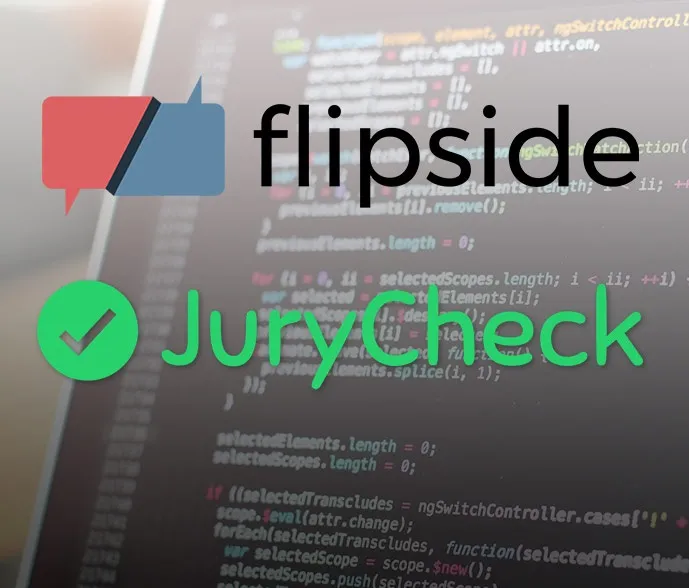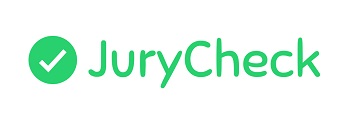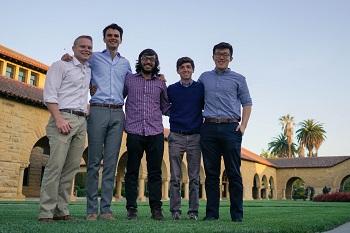With Flipside and JuryCheck, Law Students Use High-Tech Ventures to Address Social Issues

When Kate Miller, ’17, was working last summer at the Louisiana Capital Assistance Center in New Orleans, she saw how cumbersome it could be to collect data on jury composition. If lawyers needed to prove racial disparity or examine trends, they’d have to send interns to collect juror surveys—sometimes from far-flung rural parishes—and enter the information into a spreadsheet by hand. It was time-consuming, limiting, and potentially costly.
Miller thought there had to be a better way. And so that fall, she teamed up with a classmate from her Coding in the Law class, Christian Kolb, LLM ’17, to create one. The result: JuryCheck, a web-based platform that allows criminal defense attorneys, courts, and criminal justice reform advocates to detect racial and gender underrepresentation in jury pools in real time.
“JuryCheck is an ideal law and tech product because it solves a pain the founders personally experienced, and helps protect fundamental constitutional rights, fair jury representation, that are often overlooked,” said Lecturer Nikhil Abraham, JD/MBA ’11, who taught Miller and Kolb in Coding and the Law. “The people who will benefit the most from this app, the accused in a jury trial, are likely not able to pay, and the SNVC has solved the ‘who pays’ and ‘who benefits’ problem many times. I hope JuryCheck's success strengthens the jury trial process, and shows the outsized impact lawyer-coders can have on the legal system.”
Miller and Kolb are among several Law School students who are working to address complex societal issues through high-tech entrepreneurial ventures. An interdisciplinary University of Chicago team that includes Michael Killingsworth, ’18, reached the finals earlier this month in the social venture category of a Stanford University start-up challenge with Flipside, a platform that combines social science research and computer algorithms to address the “filter bubbles” that many believe have stymied American political discourse. And last year, a team of three Law School students tied for first in Booth’s Social New Venture Challenge with AccessArc, a technology service that gives prison inmates increased accessibility to legal advocacy. Both JuryCheck and Flipside will be competing in this year’s SNVC, which moves into the final round on May 18.
“It’s exciting to see UChicago law students apply their rigorous analytical training to help solve complex social issues with innovative, entrepreneurial solutions,” said Robin Ross, executive director of the Law School’s Doctoroff Business Leadership Program and an advisor to Flipside. “Helping our students connect their legal training with the world of business, entrepreneurship, and social impact is at the heart of the Doctoroff Program’s mission. It’s also gratifying to see law students work as part of a team—with students at the Law School and across the Midway—and learn valuable lessons about collaboration, communication, and leadership.”
Flipside, which was created by a team that includes undergraduate computer science majors, a former Shark Tank winner, and the former editor in chief of the Maroon, uses a complex algorithm that assesses the political ideology and moral leanings of each user and then serves up stories that reflect opposite points of view. The algorithm, however, also tracks language and tone preferences to ensure that the stories it presents actually resonate with the user and, perhaps most importantly, avoid triggering the kind of emotional response that leads many to discount across-the-aisle perspectives.
“Our intuition was that people find it jarring to read something they don’t believe. But that’s not the case,” said Sidd Sachdeva, a third-year undergraduate with a major in statistics and minor in computer science who first developed the idea.
Rather, “when you read opposing viewpoints, if it is grounded in your same moral foundation, you’re more likely to engage with that material and to seek out other material that represents opposing viewpoints,” said Killingsworth, who earned his undergraduate degree in political science, psychology, and sociology at the University of Nebraska-Lincoln.
Using data collected from a “get-to-know-you” survey, as well as a user’s Facebook “likes” and other social media profile information, the app creates a palatable flipside for each of its users. The more they engage, the more the app learns about their leanings and preferences. And as the offerings get better, social science suggests that they’ll also become more open to the opposite perspective.
“They become more diverse in their points of view, they become more engaged in the political process—and sometimes they even change their point of view, which is something that seems impossible in today’s political environment,” Sachdeva said. “Ideology, it turns out, is correlated with culture—and when you separate those variables you can broaden people’s horizons while continuing to make it comfortable for them. And the way you do that is through algorithms and natural language processing.”
It essentially offers users the experience Killingsworth has when he engages in respectful debate at the Law School.
“At the Law School, we get the debate between people of the left and people of the right, and you can sit there and debate with other people without it escalating into ad hominem attacks,” said Killingsworth. “That’s how it should be for everyone. Everyone should be able to sit down and have a conversation with someone from the other side.”
The Flipside team—which also includes Jason Li, a fourth-year economics/computer science undergraduate who founded the social enterprise iReTron as a high school sophomore and won a $100,000 investment on Shark Tank; Julia Zhou, who is working on a masters in computational social science; Forrest Sill, a third-year computer science undergraduate and the former editor-in-chief of the Maroon; and Baxter Stein, a third-year public policy studies undergraduate who serves on the student advisory board for the Institute of Politics—said University of Chicago values of interdisciplinarity and rigorous debate are woven into their group ethos.
“The culture of the marketplace of ideas is something that permeates every part of this university, and it is something all of us have internalized deeply,” Sachdeva said.
An environment that prizes a multidisciplinary approach to problem solving is also what led Miller and Kolb to create what they describe as a relatively simple step toward addressing a complex, systemic problem.
“Since the passage of the Civil Rights Act over 150 years ago, the courts and Congress have been trying to weed racial disparities out of the system of jury selection. But it hasn’t happened, largely because of these data problems,” said Miller, who was in the Law School’s Exoneration Project for two years and the Civil Rights and Police Accountability Project for one. “This is something that impacts the lives of criminal defendants, because the racial composition of a jury has a huge impact on the outcome of the trial result and in sentencing. Also, the criminal justice system at large has been de-legitimized in a lot of ways. We’re hoping to restore some faith in the process—both for making sure that people in the community are able to serve on juries and from the perspective of the defendants.”
With Jury Check, information would be entered in real time and “within seconds, a public defender or attorney would have an indication of whether a minority was underrepresented, or that there may be overrepresentation of a particular racial group,” Kolb said. “It would also give the benefit of data aggregation, so instead of having one public defender office inputting the information into one spreadsheet, we would have the collective power of multiple public defenders inputting that information and aggregating it in a central place.”
For Kolb, the experience has been a great opportunity to engage with other emerging entrepreneurs.
“Meeting all these young people who are trying to do something with technology and really tackling social problems has been one of the best parts for me. It has really enriched my LLM and Law School experience,” Kolb said. “The entrepreneurial spirit is really encouraged at the Law School and also at Booth. I didn’t ever think I’d be doing something like this before I got here. It’s been great.”
Seven finalists in the Booth competition will be announced on May 18 and will compete for the title on May 23. Those who wish to attend the Social New Venture Challenge Finals can register online.


